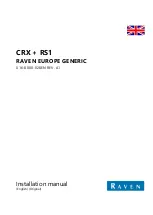
2
revision B
AT500 POWER SAVING STRATEGY
To conserve battery life, the AT500 will be in power-down (sleep) mode the vast majority of the time. Wake
criteria are:
•
Timed report due (STIM minutes elapsed since the last report)
•
Motion detected
•
Qi wireless charging is active
•
BLE device is connected
The AT500 device will remain
‘
awake
’
whilst charging, or whilst there is a Bluetooth (BLE) device connected.
Leaving the device on a Qi wireless charger is a convenient way to keep the device awake for testing,
configuration and diagnostics etc.
Motion Detection
Motion is detected, according to the sensitivity criteria defined by $MEMS
When motion is detected, the AT500 will wake and immediately report a MOTION event (reason bit 31 set).
The device will stay awake to try and get an updated location via GNSS, which if successful within the defined
timeout, will result in a GPS-REACQUIRED event being reported (reason bit 22 set) with latest GNSS data. After
reporting GPS Reacquired, the device will power down for STIM minutes. Further wakes on motion will be
inhibited for JSEC seconds, to conserve battery. Wake on motion can be disabled completely by setting
$JSEC,0 leaving only timed wake events.
Timed Wake
The AT500 will wake every STIM minutes to send a TIMED report (reason bit 0 set). Where motion detection is
enabled (JSEC non-zero), we can assume that the device is in the same location for a timed wake, and hence
battery life can be improved by disabling GNSS fix on a timed wake. Waiting for a GNSS fix can take up to 3
minutes, whereas a timed wake without GNSS is typically completed within 20s, hence battery life can be
extended quite significantly, particularly in applications where sky visibility is often limited or completely
masked (i.e. underground parking).
Fastrack Mode
FastTrack mode is used when detailed and near-live reporting is required for a short period of time. The legacy
version, without arguments, triggers a 1 minute period of reporting at 5 second intervals. From version 7.0.59,
the extended version of FastTrack mode allows specific reporting criteria and duration to be defined, as
described below.
$FTRK,<duration-min>,<metres>,<seconds>,<degrees>
<duration-min>
FastTrack mode duration, in minutes
<metres>
FastTrack mode distance reporting interval, in metres (max. 65535)
<seconds>
FastTrack mode timed reporting interval, in seconds (max. 65535)
<degrees>
FastTrack mode heading change threshold, in degrees (max. 180)





















